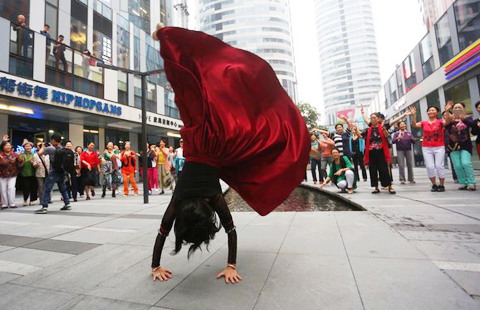Handover 'brought democracy to HK'
Updated: 2014-10-04 07:00
By ZHANG CHUNYAN(China Daily)
|
|||||||||||
A renowned British academic said Beijing has overwhelmingly honored its commitment to the principle of "One Country, Two Systems" since the Hong Kong handover in 1997 and that most protesters in the former British colony are driven by a sense of dislocation.
Martin Jacques made the comments in an article headlined "China is HK's future-not its enemy" that appeared in British newspaper The Guardian on Tuesday.
Jacques is best known for his best-selling book When China Rules the World: the End of the Western World and the Birth of a New Global Order. He is also a columnist for The Guardian and New Statesman.
In the article, he said it should be remembered that for 155 years until it returned to China. Hong Kong never enjoyed a semblance of democracy under the British. The city's 28 governors were appointed by the British government.
"The idea of any kind of democracy was first introduced by the Chinese government," he wrote, adding that in 1990 the latter adopted the Basic Law, which included the commitment that in 2017 Hong Kong's chief executive would be elected by universal suffrage. Beijing also spelt out that the nomination of candidates would be a matter for a nominating committee.
"This proposal should be seen in the context of what was a highly innovative-and, to Westerners, completely unfamiliar-constitutional approach by the Chinese," he wrote in the article, adding that the Chinese meant what they offered.
Jacques lived in Hong Kong for three years from 1998.
The article also said that Hong Kong's relationship with the mainland has been changing rapidly. "Herein lies a fundamental reason for the present unrest-the growing sense of dislocation among a section of Hong Kong's population."
During the 20 years or so before the handover, Hong Kong enjoyed its golden era-not because of the British but because of the mainlanders, Jacques wrote.
He said he believes that Hong Kong is the beneficiary of Beijing's reform and opening-up policy-it became the entry point to the mainland, and as a result attracted multinational companies and banks that wanted to gain access to the mainland market.
Hong Kong has gradually lost its role as the gateway to the mainland, he writes. Previously, the city was an unrivalled financial center, "now it is increasingly dwarfed by Shanghai. Until recently, Hong Kong was by far China's largest port-now it has been surpassed by Shanghai and Shenzhen, and Guangzhou will shortly overtake it.
"Many Hong Kong locals are struggling to come to terms with these new realities. They are experiencing a sense of displacement. They know their future is inextricably bound up with the mainland but that is very different from embracing the fact," he writes.
"There is no alternative-the Chinese mainland is the future of Hong Kong," Jacques concluded.
Related Stories
Hong Kong Chief Executive calls for peace after clashes 2014-10-04 02:00
Hong Kong gov't urges immediate end to Occupy Central 2014-10-02 18:37
Protests will leave deep scars in Hong Kong SAR 2014-10-02 07:27
Chinese mainland is Hong Kong's future: the Guardian 2014-10-01 19:57
High-wire act for US, Britain to interfere in Hong Kong affairs 2014-10-01 16:35
Today's Top News
China to start direct yuan-euro trade
Protest disrupts life in Hong Kong
Slim waist fad causing problems
Americans split over role of gov't in their lives: Gallup
Spanish diplomat killed in Sudan
Independence of MH17 probe 'crucial'
Illegal assembly in Hong Kong leads to clashes
Aggrieved firms 'should go to court'
Hot Topics
Lunar probe , China growth forecasts, Emission rules get tougher, China seen through 'colored lens', International board,
Editor's Picks

|

|

|

|

|

|





